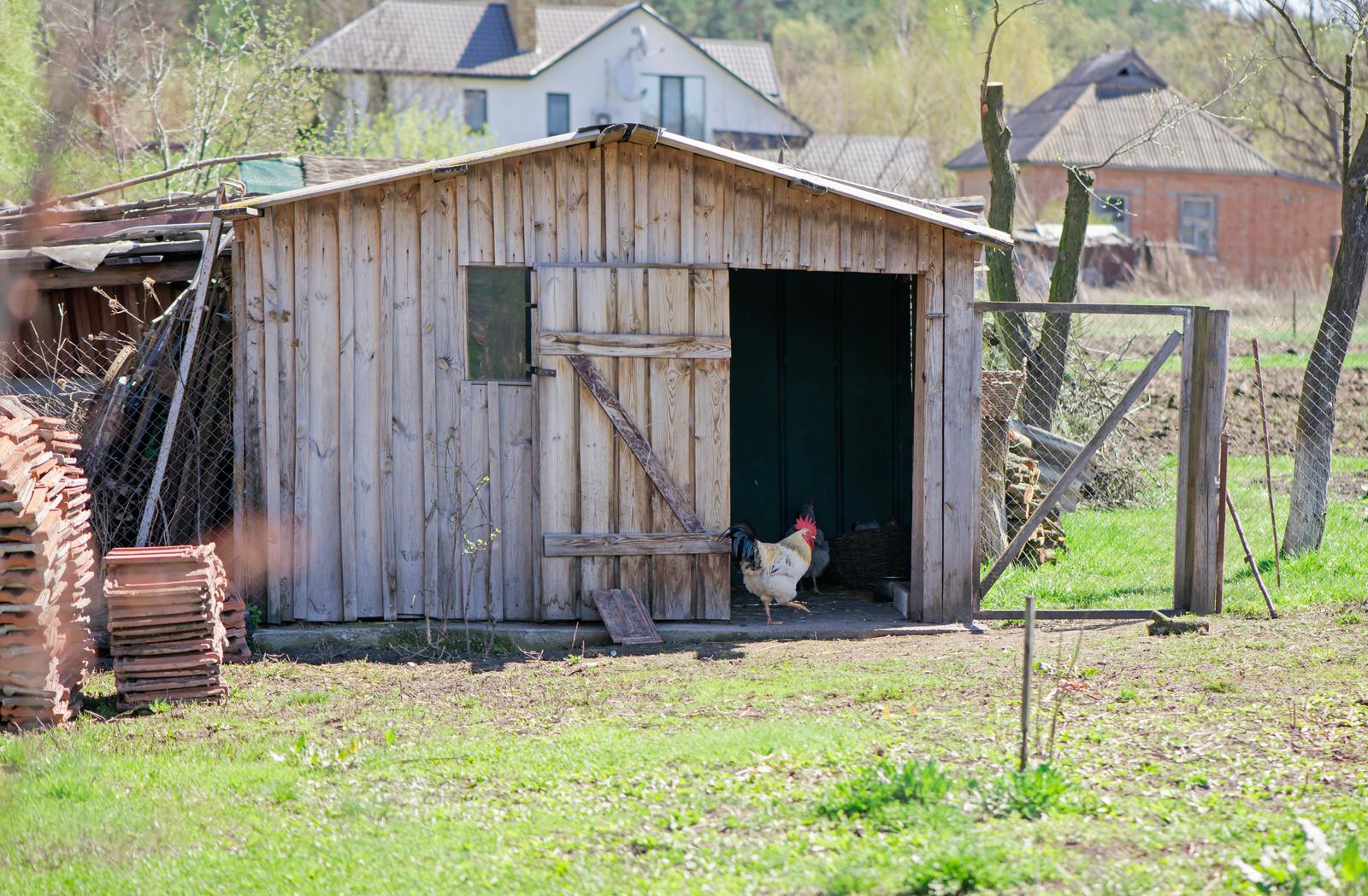Chickens are a great livestock option to keep on the homestead or in your backyard, but providing the chickens with the right amount of space is important. How much space do you need on the homestead or your backyard to keep chickens successfully?
The minimum space chickens need in a coop is about 2 to 3 square feet or 0.18 to 0.28 square meters per bird, in a run, about 8 to 10 square feet or 0.74 to 0.93 square meters per bird, and free-range chickens need about 250 to 300 square feet or 23.2 to 28 square meters per bird.
The space chickens require on your homestead, or backyard depends on several factors, such as breed, age, and purpose. We will also investigate the different living arrangements for chickens, such as coops, runs, and free-range systems, and provide tips on how to design them to meet the needs of chickens.
Space Requirements To Keep Chickens
Keeping chickens successfully means providing the ideal conditions for them to grow and thrive. Part of the conditions needed to keep your chickens healthy and productive is providing them with the correct space requirements.
We will examine the space requirements for chickens so you can be equipped with the knowledge to create a comfortable and healthy living environment for your feathered friends.
Space For Chickens In A Coop
A coop is an enclosed living space where chickens can rest, roost, and lay eggs. It’s essential to provide your chickens with a comfortable and secure coop that meets their space requirements.
The minimum space requirement for chickens in a coop is about 2 to 3 square feet or 0.18 to 0.28 square meters per bird. However, this space requirement can vary depending on the size of the chicken breed. For instance, larger breeds like the Brahmas and Cochins may need up to 5 square feet or 0.46 square meters per bird.
When designing a coop, it’s important to ensure proper ventilation and insulation to maintain a comfortable temperature and air quality for your chickens.
It is necessary to consider the layout and placement of perches, nesting boxes, and food and water stations to provide ample space for your chickens to move around and avoid overcrowding.
You can refer to our article “Top Chicken Coop Tips” for more information on setting up your chicken coop to care for your chickens correctly.
It’s important to note that chickens should not spend all their time in the coop, as they also need access to a run or free-range area for exercise, foraging, and socialization. The coop is primarily a space for chickens to sleep and lay eggs, so it is crucial to ensure they have adequate space to do so comfortably.
The coop should provide a safe and comfortable living space for chickens, with enough room to move around, roost, and lay eggs. Providing adequate space for chickens in a coop will prevent the spread of disease and parasites and ensure their well-being and productivity.
Space Requirements For Chickens In A Run
A run is an outdoor area where chickens can move around, forage, and exercise. The chicken run is often the enclosed area around the chicken coop.
Providing your chickens with a run is essential to their health and well-being, allowing them to engage in natural behaviors, exercise, and maintain a healthy weight.
The minimum space requirement for chickens in a run is about 8 to 10 square feet or 0.74 to 0.93 square meters per bird. This space requirement can vary depending on the size of the chicken breed and the number of birds you have. Larger breeds and flocks may need more space to avoid overcrowding and reduce stress.
When designing a run, it’s crucial to ensure it’s secure and predator-proof to keep your chickens safe from predators. You can achieve this by using sturdy fencing, covering the top of the run, and burying the fencing underground to prevent predators from digging underneath.
Many people new to keeping chickens are unaware that chickens also need entertainment. Bored chickens may bully other chickens or pull out their feathers.
Besides providing adequate space, it is a good idea to consider adding enrichment items to the chicken run, such as perches, dust baths, and toys, to keep your chickens entertained and stimulated.
The run is essential for chickens to engage in natural behaviors and maintain their physical and mental health. Providing your chickens with a secure and spacious run will promote your flock’s well-being, happiness, and productivity.
Space For Free Range Chickens
Free-range chickens can roam and forage for their food, which is an excellent way to ensure their physical and mental health. However, to keep them safe and healthy, you must provide adequate space and a safe environment.
The minimum space requirement for free-range chickens is about 250 to 300 square feet or 23.2 to 28 square meters per bird. This is an average space requirement, and larger breeds and flocks may need more space to avoid overcrowding and reduce stress.
Many homesteaders allow their chickens to free range during the day as a means to control pests and weeds in the garden. The birds are then housed in the chicken coop at night to protect them from night-time predators.
Generally, free-range chickens require a considerable amount of space to roam and forage. If you have a small property, this option may not be feasible. In that case, the chicken run must be spacious enough to provide the birds with more than the minimum space requirements.
Space For Egg-laying Chickens
Egg-laying chickens require adequate space to lay eggs comfortably and maintain their productivity. Providing them with a comfortable and stress-free environment is crucial for their continued productivity and egg quality.
Chickens generally lay their eggs in nesting boxes in the chicken coop unless the birds are free-range. This means your chicken coop must be large enough to accommodate chickens roosting and nest boxes for the chickens to lay eggs.
The general number of nesting boxes needed is one for every 3 to 4 chickens in the flock. Considering most flocks are roughly 12 chickens, you will need 3 to 4 nesting boxes inside the coop.
The ideal nesting box size is 12 inches wide by 12 inches deep and 12 inches high, or 30cm by 30cm by 30cm. The nesting boxes should be located in a quiet part of the coop away from the other birds to give the hens the security and privacy they need for egg-laying.
Space For Meat Chickens
Meat chickens, also known as broilers, require a different space allocation than egg-laying chickens. They grow rapidly and require more space to move around and exercise to maintain their health and well-being.
The minimum floor space requirement for meat chickens is about 1 to 2 square feet or 0.09 to 0.18 square meters per bird, with the average being 1.5 square feet or 0.14 square meters.
Climate can play a significant role in the space requirement for meat chickens, and in hot weather, you may need to increase the minimum space requirements to 2.5 square feet or 0.23 square meters for each bird.
It is essential to remember that this space requirement can vary depending on the size of the chicken breed and the number of birds you are raising. Larger chicken breeds and larger numbers of birds may need more space to avoid overcrowding and reduce stress.
Meat chickens require a balanced diet and access to clean water to maintain their growth and health. You can achieve this by providing them with enough space and access to high-quality feed and clean water at all times.
Meat chickens reach maturity within 6 to 8 weeks and are typically harvested at this time. You must ensure that the space you provide for them is suitable for their growth and development until they reach maturity.
Conclusion
Providing chickens with adequate space is crucial for their health, well-being, and productivity. The space requirement for chickens can vary depending on the breed, age, and purpose of raising them.
It’s important to ensure that the space you provide for your chickens is safe, secure, and predator-proof. Understanding the space requirements for chickens is essential for raising chickens successfully on the homestead or in your backyard.
References
https://extension.psu.edu/management-requirements-for-meat-bird-flocks
https://grubblyfarms.com/blogs/the-flyer/how-big-of-a-coop-do-i-need
https://www.hgtv.com/outdoors/gardens/animals-and-wildlife/how-to-make-chicken-nesting-boxes


